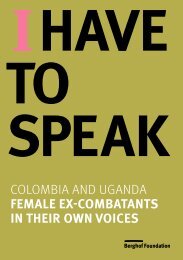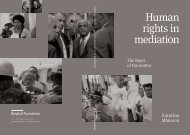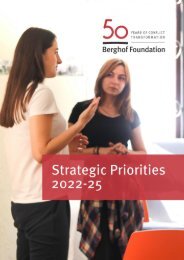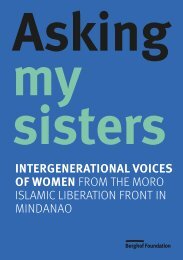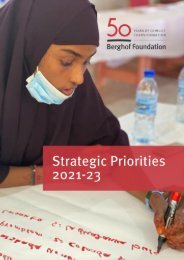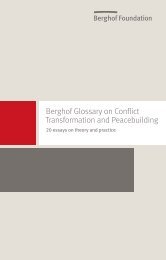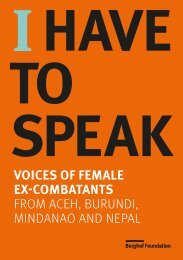Berghof Foundation: 50 years of conflict transformation
This book provides an overview of the Berghof Foundation’s work and impact over the past 50 years and sheds light on the challenges ahead of peacebuilding.
This book provides an overview of the Berghof Foundation’s work and impact over the past 50 years and sheds light on the challenges ahead of peacebuilding.
Create successful ePaper yourself
Turn your PDF publications into a flip-book with our unique Google optimized e-Paper software.
Online safety nets against<br />
sectarian polarization<br />
Lebanon 2017–2020<br />
Conflict has left its mark on Lebanon’s capital, Beirut.<br />
Photo: Peace Counts<br />
Lebanon has a wealth <strong>of</strong> experience in religious,<br />
political and inter-group dialogue. Yet the Sunni-<br />
Shia sectarian divide keeps resurfacing during<br />
major national crises such as those which the<br />
country has been witnessing recently. Hate speech,<br />
misinformation and sectarian polarisation have been<br />
spreading on the various social media platforms that<br />
people use to find news and information, express<br />
their opinions, engage in public debate or mobilise for<br />
their causes.<br />
With the support <strong>of</strong> the Swiss Federal<br />
Foreign Office and the Norwegian Ministry <strong>of</strong> Foreign<br />
Affair, the <strong>Bergh<strong>of</strong></strong> <strong>Foundation</strong> has been supporting<br />
the establishment <strong>of</strong> safety nets against Sunni-<br />
Shia polarisation in Lebanon since 2017. This work<br />
enabled the formation <strong>of</strong> a group <strong>of</strong> 16 young Sunni<br />
and Shia media influencers. These well-known and<br />
charismatic individuals formed a diverse group,<br />
with contrasting political views and, in some cases,<br />
existing animosities towards each other at the outset<br />
<strong>of</strong> the project. Based on a shared concern about<br />
sectarian incitement and hate speech on social<br />
media, the group came together in regular dialogue<br />
meetings and capacity- and team-building activities.<br />
Together, they developed content addressing<br />
stereotypes in order to ease sectarian polarisation<br />
and emphasise shared values <strong>of</strong> inclusive citizenship.<br />
Through this process, the group managed to<br />
overcome their initial animosities towards each other<br />
and found a balanced way <strong>of</strong> presenting different<br />
opinions or agreeing on compromise solutions, which<br />
was a major success. A testimony given by one <strong>of</strong> the<br />
group members speaks for itself: “I used to be very<br />
mean and aggressive online […] My involvement in<br />
the project was like therapy to me: it made me deal<br />
with my bottled-up anger and hence totally<br />
changed my behaviour and attitude.”<br />
The group not only produced social media<br />
content and conducted outreach activities to raise<br />
awareness <strong>of</strong> the critical importance <strong>of</strong> social<br />
media as a tool for escalation and de-escalation.<br />
Its members also engaged in practical de-escalation<br />
activities at a time <strong>of</strong> political tension and an<br />
increasingly fragile security situation. Two <strong>of</strong> these<br />
engagements are particularly noteworthy.<br />
On 29 October 2019, hundreds <strong>of</strong> progovernment<br />
demonstrators attacked a protest<br />
camp in central Beirut’s Martyrs’ Square, set up by<br />
anti-government demonstrators who were calling<br />
on the government to step down. The attackers tore<br />
down tents, beat up some <strong>of</strong> the anti-government<br />
protesters and chased them away. The following<br />
night, one <strong>of</strong> the attackers appeared on a popular<br />
talk show on Lebanese TV. Although apologetic,<br />
he justified his group’s actions as consequences <strong>of</strong><br />
incitement and political agitation. He was roundly<br />
criticised on social media, with calls for revenge<br />
targeting him and the community on whose behalf<br />
he was assumed to be speaking. However, several<br />
members <strong>of</strong> the social media influencers’ group<br />
quickly tried to diffuse the situation by calling on their<br />
followers to show empathy, renounce violence, and<br />
prioritise forgiveness and patriotism over emotional<br />
reactions, reflexive anger and scapegoating. Using<br />
the same screenshot <strong>of</strong> the TV interview with<br />
the attacker to demonstrate their coordinated<br />
position, they argued for de-escalation and led the<br />
communities they influence towards non-violent<br />
expressions <strong>of</strong> feelings and opinions, which was<br />
reflected in the follow-up comments and posts.<br />
This was indeed a safety net that operated in real<br />
time, underlining the impact and necessity <strong>of</strong> this<br />
work by preventing an already ugly episode from<br />
escalating further.<br />
June 2020 saw another example <strong>of</strong> the<br />
group’s attempts to calm the situation. Beirut’s<br />
streets had been mostly quiet for many weeks due<br />
to the Covid-19 lockdown. As the country was easing<br />
its restrictions on public gatherings, many protest<br />
groups issued calls for a demonstration in downtown<br />
Beirut on 6 June 2020. The call to demonstrate<br />
turned incendiary when some groups included the<br />
demand to disarm Hezbollah, a very contentious<br />
topic in Lebanese politics. The gathering became<br />
very polarised, and clashes between demonstrators<br />
and different groups broke out in the streets, with<br />
security forces getting involved. Things escalated to<br />
such an extent that the day was soon dubbed ‘Black<br />
Saturday’. Within hours, the members <strong>of</strong> the social<br />
media group were taking action. They sent out deescalatory<br />
messages and appealed for calm, called<br />
for an end to sectarian insults and accusations, and<br />
focused attention on the common problems facing<br />
the Lebanese population as a whole, as well as on<br />
the shared pain caused by economic collapse. They<br />
used the inclusive hashtag #Sectarianism_Shields_<br />
Corruption on Twitter, demonstrating their power<br />
as a safety net against further spirals <strong>of</strong> escalation.<br />
As one member <strong>of</strong> the group put it, “sectarian strife<br />
is very counter-productive to what the Lebanese<br />
are trying to achieve in their peaceful mobilisation.<br />
Sunnis, Shia, Druze and Christians, we share one<br />
country, suffering from the same problems.”<br />
56<br />
57




